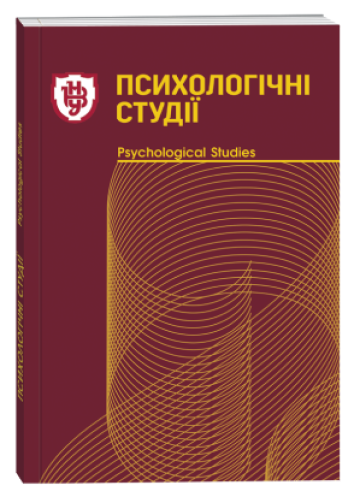PREVAILING COPING STRATEGIES OF TEACHERS IN WARTIME CONDITIONS
DOI:
https://doi.org/10.32782/psych.studies/2023.3.1Keywords:
social crises, coping strategies, internal resources, teachers, stress, well-beingAbstract
The relevance of the study of internal human resources is determined by a number of crisis phenomena in society, which are intensified by the events of the Russian-Ukrainian war. Military realities cause a number of traumatic events and social challenges, to which a person must respond adequately and find effective answers, mastering a huge arsenal of personal adaptation resources. The stressful, psychotraumatic situation associated with military events affects the mental health and well-being of every person. Teachers of secondary schools are no exception. The study of coping strategies was conducted among teachers in Khmelnytskyi and Tyachiv, Zakarpattia Oblast. People of mature age were involved in the survey, since this category is the main one in this professional group. In the course of the conducted empirical research, it was found that the dominant coping strategies in overcoming stressful and traumatic life events are teachers' orientation towards solving tasks and actively overcoming stressful and traumatic situations. Internal resources that teachers usually use to overcome stressful situations are cognitive practices and cognitive strategies, focus on social support and social belonging, reliance on one's own beliefs, value system, and willingness to follow one's philosophy of life. At the same time, it is necessary to pay attention to the development and enrichment of resources related to the expression of emotions and feelings aimed at the development of creativity, dreams and fantasies. In situations where a person is "knocked out of the rut" and has lost the ground under his feet, he should turn to those resources that have not yet been manifested or are not being used to their full extent. It is important to understand the strengths and develop weak (passive) channels, thus strengthening resistance to traumatic events and developing oneself as a harmonious balanced personality.
References
Габермас Ю. До реконструкції історичного матеріалізму. Філософія освіти. 2017. № 2(21). С. 6–28.
Ганаба С. О. Саморозвиток особистості у практиках діалогу. Науковий вісник Херсонського державного університету. Серія : Психологічні науки. 2018. № 5. С. 26–31.
Кіясь А. В. Формування ефективних копінг-стратегій учителів як захист їхнього психологічного здоров’я. Науковий часопис НПУ імені М. П. Драгоманова. Серія : № 12. Психологічні науки : зб. наукових праць. № 30 (54). Київ : НПУ імені М.П. Драгоманова, 2010. С. 76–82.
Магдисюк Л. І. Теоретично-емпіричні межі поняття ейджизму у психології. Теоретичні і прикладні проблеми психології : зб. наук. праць. 2013. № 3(32). С. 161–168.
Магдисюк Л. І. Концептуальна матриця вікової зрілості особистості в контексті її готовності до пенсії. Психологічні перспективи. 2014. Вип. 13. С. 168–178.
Застосування моделі BASIC Ph в програмі психоневрологічної реабілітації учасників бойових дій на сході України / Р. В. Микитенко та ін. Молодий вчений. 2020. № 6(82). С. 44–48.
Освіта України мовою цифр: статистичні дані напередодні реформ. URL: https://vseosvita.ua/news/osvita-ukraini-movou-cifr-statisticni-dani-naperedodni-reform-2290.html (дата звернення: 12.10.2023).
Хлівна О.М. Емоційна зрілість як умова особистісного росту. Психологічні студії. 2022. № 1. С. 46–50.
Яковлєва М.В., Каламаж Р.В., Гільман А.Ю. Домінуючі копінг-стратегії у студентів медичного коледжу. Наукові записки Національного університету “Острозька академія”. Серія : Психологія. 2022. № 15. С. 78–86.
Cicchetti D. Fractures in the crystal: Developmental psychopathology and the emergence of self. 1991. 271 р.
The Role of Sanogenic and Critical Thinking in Preventing the Emotional Burnout of Young Primary School Teachers / Н. Handzilevska et al. Youth Voice Journal. 2021.
Murphy L. Coping vulnerability and residence in childhood. Coping and adaptation. New. York : Basic Books, 1974. 420 p.
Perrez M., Reicherts M. Stress, coping, and Health. A Situation-Behavior Approach. Theory, Methods, Applications. Seattle, 1992. 230 p.







